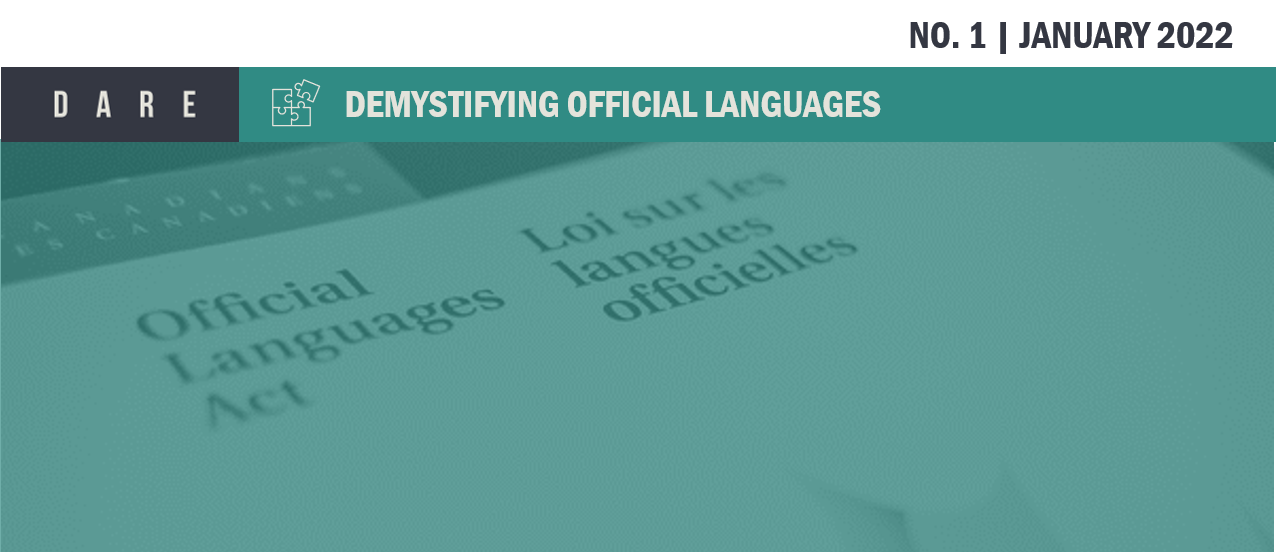Important: The GCConnex decommission will not affect GCCollab or GCWiki. Thank you and happy collaborating!
CNOLC-newsletter-no1/demystifying
DEMYSTIFYING OFFICIAL LANGUAGES
The purpose of this vignette is to clarify and explain certain concepts, articles, mechanisms and roles related to official languages. In this first issue, we suggest that you compare the roles and responsibilities of the key actors who have a role to play in matters of official languages in federal institutions – namely, the Persons Responsible for Official Languages (PROLs), the Coordinators responsible for the implementation of section 41 of the Official Languages Act, and the Official Languages Champions.
WHO DOES WHAT?
PROLs
The Persons Responsible for Official Languages, or the PROLs, are responsible for the implementation of Parts IV (Communications with and Services to the Public), V (Language of Work), VI (Participation of English-speaking and French-speaking Canadians) and section 91 (Staffing generally) of the Official Languages Act.
Their work consists in ensuring the application of official languages obligations in bilingual and unilingual regions, the active offer of service, the equal employment and advancement opportunities for English-speaking and French-speaking Canadians, the official languages requirements with regard to staffing, and that the language rights of employees are respected. They are also responsible for the coordination and preparation of their institutions’ Annual Review on Official Languages.
The Treasury Board of Canada Secretariat’s Official Languages Centre of Excellence is responsible for supporting PROLs.
Coordinators
The Coordinators responsible for the implementation of section 41 of Part VII (Advancement of English and French) of the Official Languages Act are mandated to apply the measures designed to enhance the vitality of official language minority communities (OLMC), to support their development and to promote the full recognition and use of English and French in Canada.
Their work leads them to increase employees’ awareness of the needs of OLMCs, including consulting community organizations and proposing positive measures, in the context of the development or renewal of policies, programs and services. They are also responsible for coordinating and preparing the report on Part VII of the Official Languages Act for Canadian Heritage.
Canadian Heritage’s Official Languages Branch is mandated to support them in the exercise of their duties.
Official Languages Champions
The Policy on Official Languages specifies that the role of Official Languages Champions is to “support[s] the deputy head in developing an integrated vision for the official languages program within the institution, […] promote official languages, and […] aim to have official languages considered in all its decision-making processes.”
Their role involves, among other things, showing leadership, exercising influence, listening to the issues raised by the PROLs and section 41 Coordinators, providing advice, as well as supporting the Deputy Head and the Senior Executives* responsible for the implementation of the institution’s commitments and obligations under the Official Languages Act. The Council of the Network of Official Languages Champions recommends that the champion sit on their institution’s Executive Committee.
* The Senior Executives are the functional authorities (often at the Assistant Deputy Minister level) whose branches are responsible for the application of various parts of the OLA and to whom the PROLs’ and Coordinators’ work units report.
The Champions can count on the support of the Council of the Network of Official Languages Champions.
To learn more about the role of champions, visit the Dare! Osez! site or check out this infographic document.
GOVERNANCE
Many institutions have an official languages committee or network to which these actors belong and whose mandate is to discuss official languages matters and issues within the institution.
The Best Practices Forum on Official Languages, the annual flagship event of the official languages community, is also an opportunity for the PROLs, the section 41 Coordinators and the Official Languages Champions from all federal institutions to get together, to talk about current issues and to share best practices. Now presented virtually, the Forum is open to all federal employees.
Moreover, the list of Persons Responsible for Official Languages, Official Languages Champions and persons responsible for the implementation of section 41 in institutions subject to the Official Languages Act can be found on the Treasury Board of Canada Secretariat's website.
SO, LET’S RECAP!
| PROLs | Coordinators | Functional Authorities | Champions |
|---|---|---|---|
| Implementation of Parts IV, V and VI and section 91 of the OLA. | Implementation of Part VII of the OLA. | Senior Executives whose branch is responsible for the application of OLA and to whom the PROLs and Coordinators report. | Senior Executives who support the Deputy Head and functional authorities and exercise leadership and influence in matters of official languages, all parts of the OLA combined. |
In closing, the roles of the key players responsible for official languages are complementary and their functions may vary from one institution to another. Moreover, some individuals may be called upon to play more than one role, depending on the institutions.




